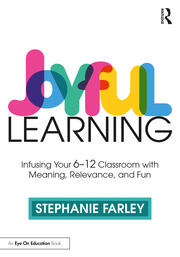Joyful Learning: Tools to Infuse Your 6-12 Classroom with Meaning, Relevance, and Fun
By Stephanie Farley
(Routledge/Eye On Education, 2023 – Learn more)
By Nicole C. Miller
 Infusing the 6-12 classroom with meaning, relevance, and fun is no small task, but a meaningful one that should be shared by secondary educators. This book, though brief at 83 pages, provides some excellent guidance and resources for many middle or high school teachers, or even pre-service educators.
Infusing the 6-12 classroom with meaning, relevance, and fun is no small task, but a meaningful one that should be shared by secondary educators. This book, though brief at 83 pages, provides some excellent guidance and resources for many middle or high school teachers, or even pre-service educators.
The author draws from her journey as an independent school educator who entered the profession with no preparation. She documents her transition from traditional methods to more progressive, student-driven practices which she characterizes as “joyful.”
Meaningful, authentic, connected, and playful learning
 The book offers methods to achieve Joyful Learning through relationships, curriculum, assessment, grading, assignments, and direction. In addition, there are two appendices with additional “extras.” According to Farley, “Joyful learning is meaningful, authentic, connected, and playful. The ‘joy’ comes from the fact that the ways we learn best and the ways we experience happiness share many of the same qualities. These include the following:
The book offers methods to achieve Joyful Learning through relationships, curriculum, assessment, grading, assignments, and direction. In addition, there are two appendices with additional “extras.” According to Farley, “Joyful learning is meaningful, authentic, connected, and playful. The ‘joy’ comes from the fact that the ways we learn best and the ways we experience happiness share many of the same qualities. These include the following:
- Meaning
- Autonomy
- Connection
- Mastery
- Positive emotions, like humor, enthusiasm, curiosity, gratitude, and optimism.” (p. 6).
Throughout, the author was vulnerable in sharing her struggles as she began her teaching career without having attended a teacher preparation program and how she learned and grew throughout her career to develop this “Joyful Approach.” This vulnerability in her process of becoming a better teacher is particularly beneficial for those teachers currently struggling with their teaching and with how to approach teaching in a way that is better not only for students, but for themselves. This book also demonstrates how a growth mindset as an educator can have positive results, again for both students and teachers.
Additionally, much of what Farley shares is grounded in meaningful educational literature and practice including things such as understanding by design and self-determination theory, documented through works cited for each chapter which are a good start for educators looking to implement some of the practices mentioned.
Some Limitations
My main concern about this book has to do with the audience that this text could serve. The author, who teaches in an independent school, references very limited standards being taught which allowed her to teach those deeply, but this is possibly more unrealistic in a public school setting.
The following is a very specific critique that I felt I couldn’t leave unmentioned. It centers on its discussion of curricular design, specifically the choice of the essential question, “In the face of monsters, madness, and mayhem, what makes life worth living?” While compelling, the question is one that is possibly not appropriate given the mental health challenges that so many adolescents are facing today. Essential questions that are meaningful to students can have a significant positive impact on teaching and learning, but this one may not be appropriate in all school settings.
Conclusion
Despite my critiques, I do believe Joyful Learning is an approachable introduction to teaching in a more student-centered manner. While it may not break new ground for well-prepared educators, it offers a student-centered vision that may serve as a gentle reminder – or an entry point – for teachers seeking to bring more meaning and fun into their practice. It offers a framework for considering key elements of teaching practice which can help teachers begin to develop their own instructional philosophy and serves as a starting point for reflection and further exploration.
Teachers at private or charter schools, particularly those who are newer to the profession or who have limited formal teacher preparation, would very likely find this book beneficial as a resource for thinking through the many facets of effective teaching.
Read another MiddleWeb review of Joyful Learning here.
Find Stephanie Farley’s MiddleWeb articles here.
Dr. Nicole C. Miller, a former middle school teacher, is an Associate Professor at Mississippi State University in the Department of Teacher Education and Leadership. She currently teaches courses focused on middle level teacher preparation at the undergraduate and graduate levels. She engages in research activities focused on middle level education, middle level teacher preparation, technology integration, and teaching with primary sources.


